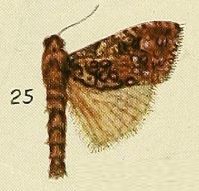Lieutenant-Colonel Thomas Herbert Elliot Jackson was an English coffee farmer in Kenya. He served as an officer in the British Army during the Second World War, seeing service with the King's African Rifles and as a military administrator in British Somaliland. Jackson served in the Kenyan colonial administration during the Mau Mau Rebellion.

The Metarbelidae are a family of the Cossoidea also called the carpenter or goat moths, and is sometimes treated as a subfamily, Metarbelinae of the Cossidae. No synapomorphies are shared with the Cossidae based on adult morphology. The family Metarbelidae was first described by Embrik Strand in 1909.

Lebedodes is a genus of moths in the family Cossidae.

Metarbela is a genus of moths in the family Cossidae described by William Jacob Holland in 1893.
Ortharbela is a genus of moths in the family Cossidae.
Lebedodes ianrobertsoni is a moth in the family Cossidae. It is found in Tanzania, where it has been recorded from the central subregion of the Eastern Arc Mountains probably extending further east into the drier coastal forests.
Lebedodes leifaarviki is a moth in the family Cossidae. It is found in Tanzania, where it has been recorded from the central subregion of the Eastern Arc Mountains.
Lebedodes willihaberlandi is a moth in the family Metarbelidae. It is found in Tanzania, where it has been recorded from the Mufindi Forests. The habitat consists of montane and upper montane woodlands and bushland.
Metarbela abdulrahmani is a moth in the family Cossidae. It is found in Tanzania, where it has been recorded from the East Usambara Mountains. The habitat consists of submontane forests.
Metarbela chidzingai is a moth in the family Cossidae. It is found in Tanzania. The habitat consists of lowland and submontane woodlands.
Metarbela lornadepewae is a moth in the family Cossidae. It is found in Tanzania, where it has been recorded from the Udzungwa Mountains. The habitat consists of montane and upper montane forests.
Metarbela shimonii is a moth in the family Cossidae. It is found in Kenya, where it has been recorded from Gogoni Forest and Kaya Muhaka. The habitat consists of legume-dominated lowland coastal forests.
Ortharbela cliftoni is a moth in the family Cossidae. It is found in Tanzania, where it has been recorded from the East Usambara Mountains. The habitat consists of submontane forests.
Ortharbela jurateae is a moth in the family Cossidae. It is found in Tanzania, where it has been recorded from the Uluguru Mountains. The habitat consists of lowland and submontane miombo woodlands.
Ortharbela sommerlattei is a moth in the family Cossidae. It is found in Tanzania, where it has been recorded from the East Usambara Mountains. The habitat consists of submontane forests.
Paralebedella estherae is a moth in the family Cossidae. It is found in Tanzania and Uganda. The habitat consists of submontane forests.
Salagena bennybytebieri is a moth in the family Cossidae. It is found in central Kenya. The habitat consists of dry submontane forests.
Salagena charlottae is a moth in the family Cossidae. It is found in Kenya, where it has been recorded from Gogoni Forest. The habitat consists of legume-dominated lowland coastal forests.
Salagena quentinlukei is a moth in the family Cossidae. Named for Quentin Luke, it is found in Tanzania and Kenya, where it has been recorded from the Taita Hills. The habitat consists of montane and upper montane areas.
Paralebedella shimonii is a moth in the family Cossidae. It is found in Kenya. The habitat consists of legume-dominated coastal forests.
